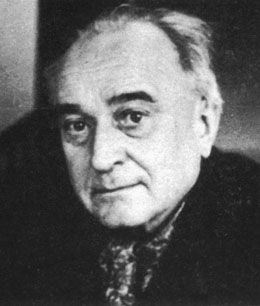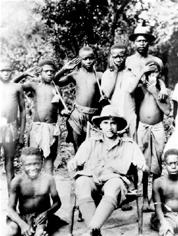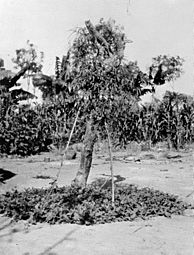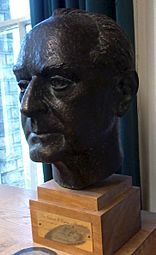E. E. Evans-Pritchard facts for kids
Quick facts for kids
Sir E. E. Evans-Pritchard
|
|
|---|---|

E. E. Evans-Pritchard
|
|
| Born |
Edward Evan Evans-Pritchard
21 September 1902 Crowborough, East Sussex, England
|
| Died | 11 September 1973 (aged 70) Oxford, England
|
| Nationality | English |
| Known for | Evans-Pritchard's theories of religion Witchcraft, Oracles and Magic Among the Azande |
| Scientific career | |
| Fields | Anthropology |
| Thesis | The social organization of the Azande of the Bahr-el-Ghazal province of the Anglo-Egyptian Sudan (1928) |
| Notable students | M. N. Srinivas Talal Asad Mary Douglas Audrey Colson John Francis Marchment Middleton Steven Lukes André Singer |

Sir Edward Evan Evans-Pritchard (born September 21, 1902 – died September 11, 1973) was an English anthropologist. An anthropologist is a scientist who studies human societies and cultures. He was very important in shaping the field of social anthropology. This is a part of anthropology that looks at how people live together in groups. He taught social anthropology at the University of Oxford from 1946 to 1970.
Contents
Studying People and Cultures
Edward Evan Evans-Pritchard went to Winchester College for school. He then studied history at Exeter College, Oxford. Later, he went to the London School of Economics (LSE) for his advanced studies.
Early Research in Africa
His first major research began in 1926. He lived with the Azande people, who live near the River Nile in Africa. This work helped him earn his doctorate degree in 1927. It also led to his famous book, Witchcraft, Oracles and Magic Among the Azande, published in 1937.
Evans-Pritchard continued his studies with the Azande until 1930. After that, he started a new research project. This time, he studied the Nuer, another group in Africa.
Understanding Beliefs and Society
His work with the Nuer people was very important. He wrote three books about them: The Nuer, Nuer Religion, and Kinship and Marriage Among the Nuer. These books, along with African Political Systems (which he helped edit), became classic works in British social anthropology.
In his book about the Azande, Evans-Pritchard explored how they understood why bad things happened. For example, if a building collapsed, the Azande might blame witchcraft. He showed how their beliefs helped them make sense of the world. His ideas were discussed by famous thinkers like Thomas Kuhn and Paul Feyerabend.
World War II Service
During the Second World War, Evans-Pritchard served in different countries. He was in Ethiopia, Libya, Sudan, and Syria. In Sudan, he helped organize local troops. They fought against the Italians using guerrilla warfare tactics.
After the war, he became a professor at the University of Oxford. He taught many students who later became important anthropologists themselves. These included M. N. Srinivas and Mary Douglas.
Later Ideas About Anthropology
Evans-Pritchard's later work focused more on the ideas behind anthropology. He thought about how anthropologists should study other cultures.
Anthropology as a Humanity
In 1950, he said that anthropology was not like a natural science. Instead, he believed it was more like the humanities, such as history. He argued that the main challenge for anthropologists is to "translate" cultures. This means trying to understand another culture from their point of view. Then, they need to explain that understanding to people from their own culture.
Studying Religion
In 1965, he published Theories of Primitive Religion. In this book, he looked at different ideas about what people at the time called "primitive" religions. He believed that anthropologists sometimes misunderstood the people they studied. They might think people had reasons for their beliefs that were actually based on the anthropologist's own culture.
He also pointed out that people who believe in a religion and those who don't might study religion differently. Non-believers might try to explain religion as an illusion. Believers might see it as a way to understand reality.
About His Life
Edward Evan Evans-Pritchard was born in Crowborough, England. His father was a church leader. In 1944, Evans-Pritchard became a Catholic.
His friends and family called him "EP." He had five children with his wife, Ioma. Evans-Pritchard passed away in Oxford on September 11, 1973.
Awards and Recognition
Evans-Pritchard received several awards for his work. These included the Rivers Memorial Medal in 1937 and the Huxley Memorial Medal in 1963. He was also the President of the Royal Anthropological Institute of Great Britain and Ireland from 1949 to 1951.
In 1971, he was made a knight. This means he was given the title "Sir." Several books were written in his honor, celebrating his contributions to anthropology.
Gallery
See also
 In Spanish: Edward Evan Evans-Pritchard para niños
In Spanish: Edward Evan Evans-Pritchard para niños
 | Janet Taylor Pickett |
 | Synthia Saint James |
 | Howardena Pindell |
 | Faith Ringgold |



